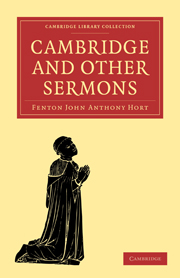Book contents
- Frontmatter
- PREFATORY NOTE
- Contents
- CAMBRIDGE AND OTHER SERMONS
- I THE PROBATION OF THE JEWS BY THE LIGHT
- II THE REVELATION TO THE SHEPHERDS
- III THE KING EXPECTED AND FOUND
- IV GOD MAKING ALL THINGS NEW
- V ST. JOHN THE EVANGELIST
- VI MAN VISITED BY GOD
- VII THE CHURCH AND ITS MEMBERS
- VIII BAPTISM AND CONFIRMATION
- IX THE DISCOVERY AND ACKNOWLEDGMENT OF SIN
- X SELF-RESTRAINT THE CONDITION OF MASTERY
- XI [REASONABLE SERVICE]
- XII CHRIST'S LOVE AND OBEDIENCE TO THE FATHER SHOWN IN HIS PREPARATION FOR DEATH
- XIII THE PEACE OF CHRIST AND THE PEACE OF THE WORLD
- XIV THE CONQUEROR FROM EDOM
- XV NEWNESS OF LIFE (A CONFIRMATION SERMON)
- XVI FAITH IN THE RESURRECTION THE FOUNDATION OF ENDURING WORK
- XVII THE PERPETUAL PRESENCE OF CHRIST
- XVIII THE BIRTHDAY OF THE CHURCH
- XIX VICTORY OVER THE WORLD
- XX THE DESIRE OF THE FLESH NOT THE DESIRE OF THE MAN
- XXI THE BATTLE OF SPIRIT AND FLESH, AND THE LIFE IN THE SPIRIT
- XXII [THE UNSPEAKABLE GIFT OF GOD] (A HARVEST FESTIVAL SERMON)
- XXIII THE EVANGELIST A PHYSICIAN
- XXIV ALL THINGS OF, THROUGH, AND TO GOD
XIII - THE PEACE OF CHRIST AND THE PEACE OF THE WORLD
Published online by Cambridge University Press: 05 October 2010
- Frontmatter
- PREFATORY NOTE
- Contents
- CAMBRIDGE AND OTHER SERMONS
- I THE PROBATION OF THE JEWS BY THE LIGHT
- II THE REVELATION TO THE SHEPHERDS
- III THE KING EXPECTED AND FOUND
- IV GOD MAKING ALL THINGS NEW
- V ST. JOHN THE EVANGELIST
- VI MAN VISITED BY GOD
- VII THE CHURCH AND ITS MEMBERS
- VIII BAPTISM AND CONFIRMATION
- IX THE DISCOVERY AND ACKNOWLEDGMENT OF SIN
- X SELF-RESTRAINT THE CONDITION OF MASTERY
- XI [REASONABLE SERVICE]
- XII CHRIST'S LOVE AND OBEDIENCE TO THE FATHER SHOWN IN HIS PREPARATION FOR DEATH
- XIII THE PEACE OF CHRIST AND THE PEACE OF THE WORLD
- XIV THE CONQUEROR FROM EDOM
- XV NEWNESS OF LIFE (A CONFIRMATION SERMON)
- XVI FAITH IN THE RESURRECTION THE FOUNDATION OF ENDURING WORK
- XVII THE PERPETUAL PRESENCE OF CHRIST
- XVIII THE BIRTHDAY OF THE CHURCH
- XIX VICTORY OVER THE WORLD
- XX THE DESIRE OF THE FLESH NOT THE DESIRE OF THE MAN
- XXI THE BATTLE OF SPIRIT AND FLESH, AND THE LIFE IN THE SPIRIT
- XXII [THE UNSPEAKABLE GIFT OF GOD] (A HARVEST FESTIVAL SERMON)
- XXIII THE EVANGELIST A PHYSICIAN
- XXIV ALL THINGS OF, THROUGH, AND TO GOD
Summary
“These things I have spoken unto you that in me ye might have peace.”
—John xvi. 33.The last words of the text are those which dwell most in our minds. But if we wish to understand the sense in which the Lord Himself meant them, we must begin at the beginning.
”These things I have spoken unto you,” He said. What then were “these things”? They were His laast discourse on earth, that long conversation, or address (one hardly knows which to call it), occupying four well-known chapters of St. John which followed the Last Supper. In the next chapter, Christ no longer speaks to men, but to God: it is His last prayer and communing with the Father about the work that had been given Him to do. Here in the text we have the close of His teaching to the disciples. He had already been rejected by the world, and ceased to speak to the world. All through that evening thus far He was withdrawn from the crowds in the country or the city, and alone in private with those few who had been following Him as their Master and Lord. What He said on such an occasion could not be quite like His common preachings. There must be words fit to be spoken in the ears of Apostles, which it would have been worse than useless to have proclaimed aloud in the temple or on the mountain. It is to these most sacred outpourings of His heart to those who loved Him best that He refers, when He says they were spoken, in order that peace might be had in Him.
- Type
- Chapter
- Information
- Cambridge and Other Sermons , pp. 143 - 155Publisher: Cambridge University PressPrint publication year: 2009First published in: 1898



